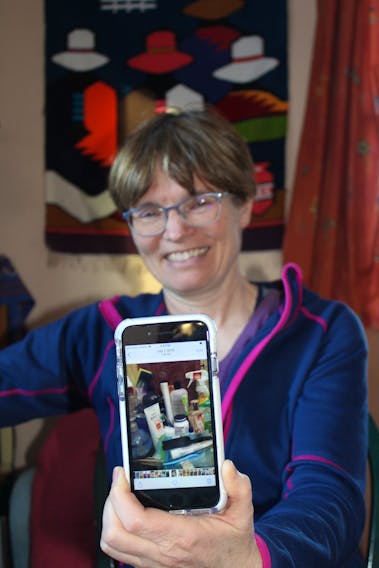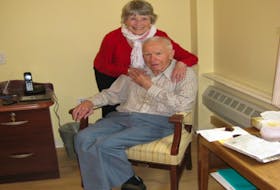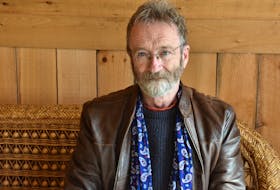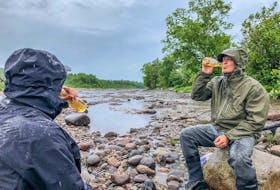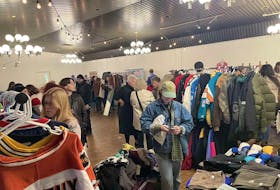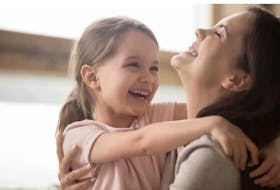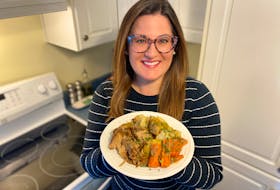SACKVILLE, N.B. — Plastics. They are everywhere. From food packaging to drink bottles to shampoo containers and toothpaste tubes, single-use plastics have become an abundant part of our everyday lives.
Yet as these items continue to pile up in our landfills, and pollute our oceans and our waterways, millions of people around the world are becoming part of a global movement to reduce the amount of plastic waste they generate every day. Sackville’s Karin Aurell is one of them.
For Aurell, it was a Tim Hortons coffee cup that ended up being her turning point.
After having forgotten her reusable mug at home, Aurell stopped to grab a coffee on her way to work one day last June. But walking across the parking lot with the disposable cup in hand, she recalls being hit with a wave of shame. That’s when she knew she needed to make a change.
“I was feeling so embarrassed and I decided I never wanted to feel like that again. I just came to the realization, ‘hey, I’m not ok with this anymore.”

This was not the first time Aurell had felt guilt over the amount of plastic she was using; but it was about to be the last.
She said every garbage day, when she would carry her bags to the curb, she would ask herself ‘why am I producing this much waste?’ She knows recycling has not proven to be all that effective and she felt it might be time to make more of an effort to stop bringing plastic into her home.
“I just really started to think about how our hope for the future of the planet is actually something we are obligated to act on,” she said. “You can’t just sit and randomly hope that something will change for the better.”
So that’s when ‘My Plastics Challenge’ was born. Initially, Aurell thought she might try it for a month and see how it went. But that month turned into six months, then eight months, and now it has become an entire lifestyle change.
“I think I realized really fast that there was no turning back,” she said.
Aurell’s Advice
- Do one thing at a time. Every change makes a difference and you don’t have to be as “obsessive” as she is when getting rid of the plastics in your household.
- Bring your bags to the grocery store.
- Bring your travel mug and stop buying drinks in disposable cups or single-use bottles.
- Aurell said by doing these three things, most people can cut their consumption by 40 to 50 per cent.

Although not entirely social-media savvy, Aurell said her challenge, which she had posted on Facebook, started drawing much more interest than she expected and quickly took on a life of its own.
She soon started getting advice and tips from people she didn’t even know, suggestions Aurell found were extremely helpful and valuable.
“There are so many people out there who have been good at this for a long time.”

Aurell said she and her partner have been learning as they go, taking on the plastics in their home one step at a time. And while she admits it hasn’t been an easy journey, it’s proven to be a much more meaningful and educational experience than she ever imagined.
“It’s no longer just a challenge. It’s a habit at this point.”
She hopes that whatever she is learning and sharing throughout her challenge will pave the way for others to make changes in their lives as well.
Aurell’s starting point was, of course, food and its packaging. Grocery shopping has turned out to be an eye-opening experience and Aurell said you realize very quickly when walking through the aisles how little you can buy.
Specialty shops like the Bulk Barn and the Corn Crib have been Aurell’s go-to stores in recent months, which has been made easier because she works in the Moncton area one day a week. The Sackville Farmers’ Market also has some great plastic-free finds, she said, including plenty of produce items, bakery goods, ready-to-go meals, and more.
She admits her shopping trips now require a lot more planning – ensuring she has the proper receptacles – and doing it to the extent she has is certainly not for everyone. She avoids nearly all foods packaged in plastic, although one of the exceptions she makes is buying milk so she can make homemade yogurt.
She said shopping at the local grocery stores is something she wants to keep working on because she thinks it’s important to keep them viable – and she does admit she’s starting to be met with more acceptance when making specific requests. For example, she says after speaking with the manager at the Sackville Foodland, the store has ordered in waxed paper to package meat or fish, upon request.
Did you know?
- Every year, Canadians throw away over three million tonnes of plastic waste.
- About one-third of the plastics used in Canada are for single-use or short-lived products and packaging.
- Up to 15 billion plastic bags are used every year and close to 57 million straws are used daily.
- Less than 10 per cent of plastic used in Canada gets recycled.
- Globally, one garbage truckload of plastic waste enters the ocean every minute.
- The federal government has pledged to ban harmful single-use plastics as early as 2021 where supported by scientific evidence and warranted (such as plastic bags, straws, cutlery, plates and stir sticks).
SOURCE: Canadian Government website
Aurell’s focus during the challenge also turned to personal hygiene items – from shampoos to toothpaste, from lotions to soaps. She said this transformation has taken a bit longer because she wanted to first use up what they already had. Aurell has also made a shift from laundry detergent to using dried chestnut pieces.
Cleaning products are also on her list of items to rid out of her household once they are used up, to be replaced by more natural products such as vinegar and water.
Aurell said the plastic packaging, wrap, bags, and containers that were already in her home when she started the challenge are being re-used as much as possible. The most recent bag she set out for curbside collection a couple of weeks ago was the first one since Christmas. She said the plastics challenge has made a huge difference to what goes out from their household for recycling.
“I want to see the conversation turn away from how we can recycle this to how we can stop buying stuff,” she said. “The less stuff we can send to recycling, the better. So we just need to have less things come into our home.”
Her new challenge for 2020? No new clothing purchases.

